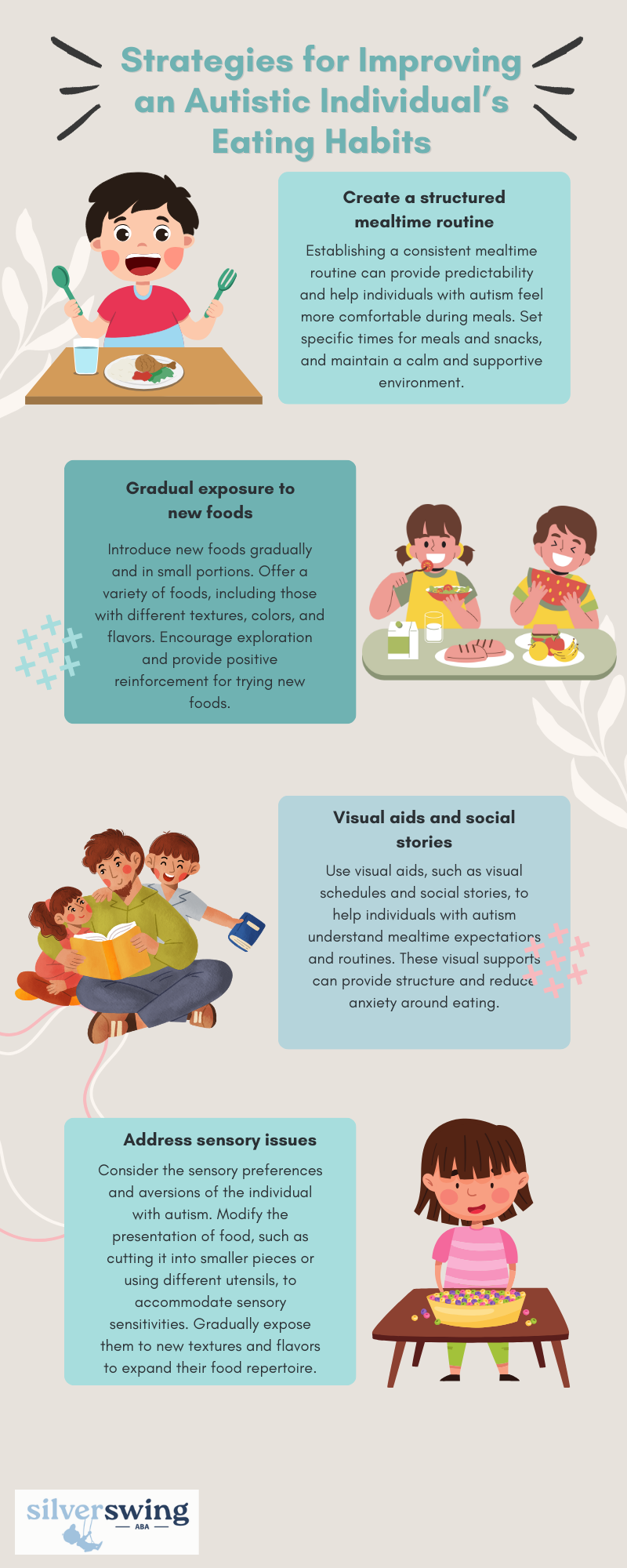Children with autism spectrum disorder (ASD) tend to experience more food refusal than their typically developing counterparts. In fact, studies have shown that children with ASD refuse approximately 41.7% of the foods offered to them, whereas typically developing children refuse only 18.9% of the foods offered.
There are several factors that contribute to food refusal in children with autism. One of the primary factors is sensory sensitivity.
Many children with ASD have sensory issues, such as tactile defensiveness, which can make them more sensitive to certain textures, smells, and tastes of food. This sensitivity can lead to a reluctance or refusal to try new foods.
Additionally, children with ASD often have underdeveloped muscles for biting, chewing, and swallowing, which can further contribute to their difficulty in tolerating new foods. These challenges in eating can make children with autism more prone to developing digestive conditions and eating disorders.
So, does it mean that autism can actually affect eating habits of affected individuals? Let’s find out!

Narrow Food Range in Autism
A common characteristic of eating habits in individuals with autism is a narrower range of foods in their diet. Compared to individuals without autism, those with ASD tend to eat a significantly limited variety of foods.
In a study comparing food selectivity in children with ASDs and typically developing controls, parents of children with ASDs reported that their children refused significantly more foods and had a less varied diet than children without ASDs. This narrow food range can be attributed to sensory issues, as well as the difficulty in accepting and adapting to new tastes and textures.
Understanding these challenges and the impact they have on eating habits is crucial for parents and caregivers of individuals with autism. By recognizing the specific needs and preferences of individuals with ASD, it becomes possible to develop strategies and approaches to improve their eating habits and overall well-being.

Autism and Gastrointestinal Issues
There is a strong link between autism spectrum disorder and gastrointestinal issues. In fact, many children with autism experience gastrointestinal dysfunction, which can significantly impact their eating habits and overall well-being.
Additionally, the impact of sensory processing difficulties on eating should not be overlooked.
Research has shown a significant correlation between eating problems and GI dysfunction in children with autism. Autistic children are more likely to experience gastroenterological disorders that can make eating painful and uncomfortable. These disorders can include conditions such as constipation, diarrhea, acid reflux, and irritable bowel syndrome.
The physical discomfort caused by GI issues can lead to food refusal and decreased appetite in children with autism. The resulting limited food intake can negatively affect their nutritional status and physical development over time.

Impact of Sensory Processing on Eating
Sensory sensitivity is another factor that can significantly affect the eating habits of individuals with autism. Many children with ASD have sensory processing difficulties, which can manifest as hypersensitivity or hyposensitivity to certain sensory stimuli. These sensory issues can extend to food textures, smells, tastes, and even the physical act of eating.
Sensory sensitivity, such as tactile defensiveness, may contribute to food selectivity in children with autism. The aversion to certain textures, smells, or tastes can make it challenging for them to tolerate a wide range of foods. This can result in a narrow food range and difficulty accepting new or unfamiliar foods.
It is important to understand and address these sensory issues when working on improving the eating habits of individuals with autism.
If you are concerned about your child’s eating habits or suspect gastrointestinal issues, it is recommended to seek professional help. Medical professionals such as dentists, dieticians, psychologists, pediatricians, occupational therapists, and counselors can play a vital role in assessing and treating the eating issues caused by autism.
Your child’s general practitioner can provide referrals to these professionals who can provide specialized support and guidance.

Common Eating Challenges in Autism
Individuals with autism often face unique eating challenges that can impact their dietary habits and overall nutrition. Let’s have a look at the two most common eating challenges.
Sensory Sensitivity
People with autism have divergent sensory processing experiences across various sensory systems, including taste perception and processing. This can significantly affect their eating behaviors.
Autistic individuals may find certain tastes, smells, textures, colors, or temperatures of foods or drinks aversive, triggering sensory issues known as food aversion. These aversions can cause significant challenges in eating and limit the variety of foods an individual is willing to consume.
Food Neophobia
Food neophobia refers to the fear or aversion to trying new or unfamiliar foods. Many individuals with autism experience food neophobia, which can further restrict their dietary choices. The fear of the unknown or unfamiliar can make it challenging for autistic individuals to accept and try new foods, leading to a limited diet.
To address food neophobia, it can be helpful to gradually introduce new foods in a non-threatening manner. This may involve presenting new foods alongside familiar foods, offering small portions, and using visual aids or social stories to prepare and familiarize the individual with the new food.
Creating a positive and supportive eating environment can also encourage autistic individuals to explore new food options.
Understanding and addressing these common eating challenges in autism is crucial for promoting healthy eating habits and ensuring adequate nutrition. By recognizing and accommodating sensory sensitivities and addressing food neophobia, caregivers and parents can support individuals with autism in developing a more varied and balanced diet.
How to Improve an Autistic Individual’s Eating Habits
Improving eating habits in individuals with autism requires a tailored approach. Here are some strategies that can help:

Remember, it’s important to be patient and understanding when addressing eating issues in individuals with autism. Each person is unique, and what works for one individual may not work for another.
By implementing these strategies and seeking professional support, parents and caregivers can help improve the eating habits and overall well-being of individuals with autism.
Sources:
https://www.autismspecialtygroup.com/blog/autism-eating-habits
https://www.verywellhealth.com/connections-between-autism-and-nutrition-4155118
https://www.ncbi.nlm.nih.gov/pmc/articles/PMC3601920
https://www.autism.org/autism-eating-related-behaviors
https://exceptionalindividuals.com/about-us/blog/autism-eating-habits-and-behaviours




